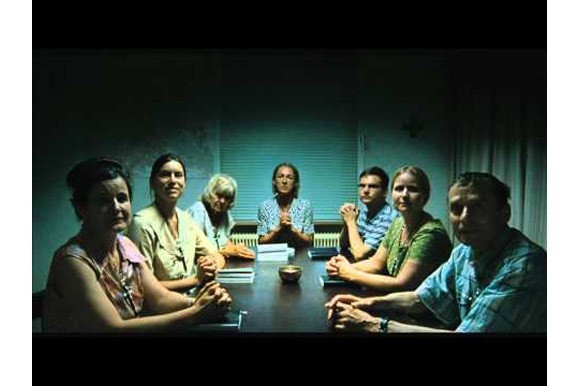While the title of the trilogy is paradise this second part reminds us of Werner Herzog’s comment about Seidl’s work when he said that Seidl was the only director that allowed him to look directly into hell. Paradise: Faith is definitely much closer to hell than to paradise.
The film open with Annamaria, an X-ray technician, devoting her vacation to spreading her version of Christianity throughout Vienna. Annamaria is the sister of Teresa, the main character of the first film in the trilogy, Paradise: Love, who seeks to find love in Kenya where she pays for sex with the locals.
Annamaria has a different vision of how paradise on earth is to be achieved. She belongs to an extreme Catholic sect that believes in practice flagellation and other medieval practices along with a belief that statues of the Virgin Mary can actually bring both physical and spiritual healing to people.
Annamaria sets off to neighbourhoods around Vienna carrying a foot-high statue of the Virgin Mary and knocking on doors. Surprisingly many people let her in. Some want to debate the nature of her beliefs. Others like a crazy old man with a mania for collecting junk in his overloaded apartment are ready to pray with her in one of the film’s more successful and more humourous scenes. A drunken Ukrainian prostitute tries to kill Annamaria with a kitchen knife. Rumour is that the woman was actually drunk during the filming of the lengthy and unconvincing scene.
Scenes of Annamaria and her friends alternate with scenes of her fanatical worship and flagellation and other scenes of self-punishment required by her sect. She also practices sexual abstinence and the relationship between her religious beliefs and her sexual frustration are obvious.
But Annamaria’s routine is upset by the return of her husband, an Egyptian Muslim, who is confined to a wheel-chair and who has been absent for many years. Her husband moves back in and wants Annamaria to take care of him physically and well as taking care of his sexual needs. She not only refuses but treats him in a totally inhumane way locking away his wheelchair and leaving him to crawl around the flat dragging himself by his elbows.
Seidl has said that he based the film on his earlier documentary Jesus You Know which was actually about such a sect of extreme Catholicism in Vienna. The director said he became fascinated by the relationship between husband and wife and the inability of the central character to realize that her extreme beliefs were leading her to the most un-Christian of behavour, the lack of love for one’s fellow man.
Paradise: Faith is shot with the typical Seidl documentary look and style of his feature films. But despite it being based on real life characters it somehow fails to convince that the characters could ever exist in any real world. The psychological cruelty of Seidl’s view of his characters makes his films touch viewing even at his best as a story teller. In Paradise: Faith the characters and scenes fail to convince and the clichés such as the masturbation with the cross are so expected that you almost wait for them to appear for ten minutes before they actually materialize on the screen. This topic was much better explored already in his earlier documentary. Special mention should to to Maria Hofstatter who turns in a great performance with this difficult material.
Credits:
Austria, France, Germany
Director/Scriptwriter: Ulrich Seidl, Veronika Franz
DoP: Wolfgang Thaler, Ed Lachman
Cast: Maria Hofstätter, Nabil Saleh
